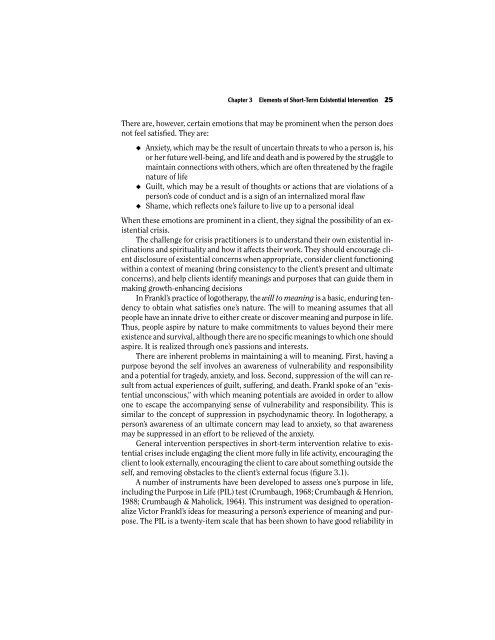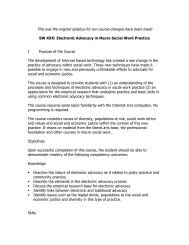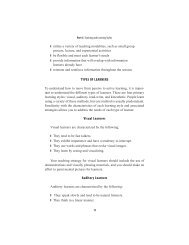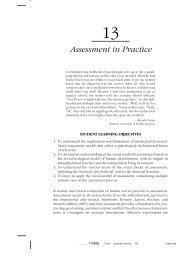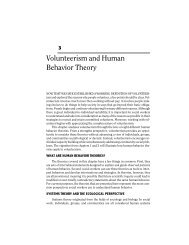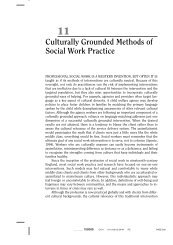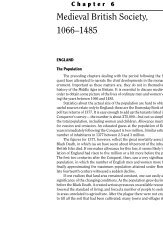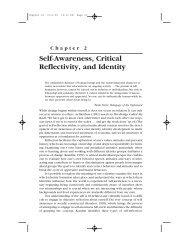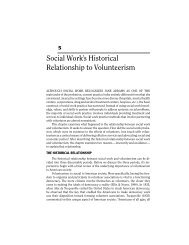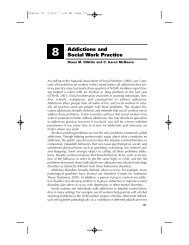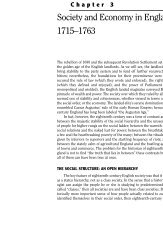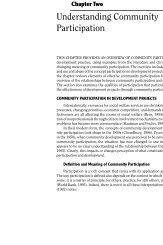Elements of Short-Term Existential Intervention - Lyceum Books
Elements of Short-Term Existential Intervention - Lyceum Books
Elements of Short-Term Existential Intervention - Lyceum Books
You also want an ePaper? Increase the reach of your titles
YUMPU automatically turns print PDFs into web optimized ePapers that Google loves.
Chapter 3 <strong>Elements</strong> <strong>of</strong> <strong>Short</strong>-<strong>Term</strong> <strong>Existential</strong> <strong>Intervention</strong> 25<br />
There are, however, certain emotions that may be prominent when the person does<br />
not feel satisfied. They are:<br />
◆ Anxiety, which may be the result <strong>of</strong> uncertain threats to who a person is, his<br />
or her future well-being, and life and death and is powered by the struggle to<br />
maintain connections with others, which are <strong>of</strong>ten threatened by the fragile<br />
nature <strong>of</strong> life<br />
◆ Guilt, which may be a result <strong>of</strong> thoughts or actions that are violations <strong>of</strong> a<br />
person’s code <strong>of</strong> conduct and is a sign <strong>of</strong> an internalized moral flaw<br />
◆ Shame, which reflects one’s failure to live up to a personal ideal<br />
When these emotions are prominent in a client, they signal the possibility <strong>of</strong> an existential<br />
crisis.<br />
The challenge for crisis practitioners is to understand their own existential inclinations<br />
and spirituality and how it affects their work. They should encourage client<br />
disclosure <strong>of</strong> existential concerns when appropriate, consider client functioning<br />
within a context <strong>of</strong> meaning (bring consistency to the client’s present and ultimate<br />
concerns), and help clients identify meanings and purposes that can guide them in<br />
making growth-enhancing decisions<br />
In Frankl’s practice <strong>of</strong> logotherapy, the will to meaning is a basic, enduring tendency<br />
to obtain what satisfies one’s nature. The will to meaning assumes that all<br />
people have an innate drive to either create or discover meaning and purpose in life.<br />
Thus, people aspire by nature to make commitments to values beyond their mere<br />
existence and survival, although there are no specific meanings to which one should<br />
aspire. It is realized through one’s passions and interests.<br />
There are inherent problems in maintaining a will to meaning. First, having a<br />
purpose beyond the self involves an awareness <strong>of</strong> vulnerability and responsibility<br />
and a potential for tragedy, anxiety, and loss. Second, suppression <strong>of</strong> the will can result<br />
from actual experiences <strong>of</strong> guilt, suffering, and death. Frankl spoke <strong>of</strong> an “existential<br />
unconscious,” with which meaning potentials are avoided in order to allow<br />
one to escape the accompanying sense <strong>of</strong> vulnerability and responsibility. This is<br />
similar to the concept <strong>of</strong> suppression in psychodynamic theory. In logotherapy, a<br />
person’s awareness <strong>of</strong> an ultimate concern may lead to anxiety, so that awareness<br />
may be suppressed in an effort to be relieved <strong>of</strong> the anxiety.<br />
General intervention perspectives in short-term intervention relative to existential<br />
crises include engaging the client more fully in life activity, encouraging the<br />
client to look externally, encouraging the client to care about something outside the<br />
self, and removing obstacles to the client’s external focus (figure 3.1).<br />
A number <strong>of</strong> instruments have been developed to assess one’s purpose in life,<br />
including the Purpose in Life (PIL) test (Crumbaugh, 1968; Crumbaugh & Henrion,<br />
1988; Crumbaugh & Maholick, 1964). This instrument was designed to operationalize<br />
Victor Frankl’s ideas for measuring a person’s experience <strong>of</strong> meaning and purpose.<br />
The PIL is a twenty-item scale that has been shown to have good reliability in


